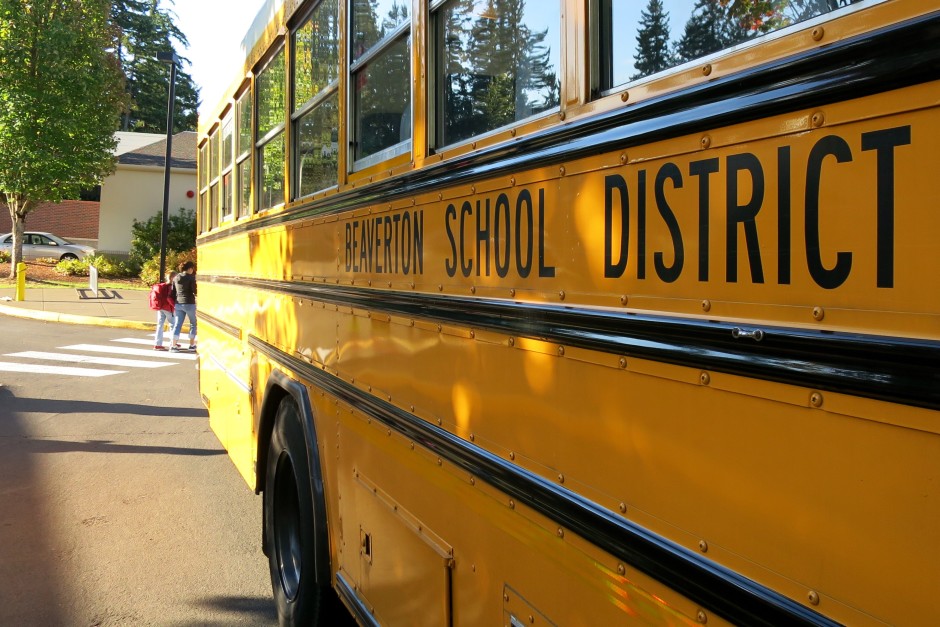Recently, the Beaverton School District became the first school district in Oregon to enroll in the state’s Clean Fuels Program. This is a big deal, not only because propane is cheaper and cleaner than traditional gasoline, but because the Beaverton School District has the largest publicly owned fleet in the state of Oregon. By making the switch to propane and signing up to generate credits through Oregon’s Clean Fuels Program, the Beaverton School District is highlighting for other school fleets just how well clean fuels can work — for students, bus drivers, school district budgets, and communities as a whole.
Currently, the Beaverton School District’s bus fleet consists of 315 active buses and provides service to about 30,000 students every day. In addition to their daily routes, they also provide service for field trips, athletic events, and various after-school programs. A typical Beaverton School District bus travels over 3,000,000 miles annually. Beaverton School District began its fleet conversion by purchasing 12 propane school buses in 2015, and followed that purchase up with 12 more in 2016 and 14 in 2017. The district was also recently awarded a $60,000 grant to purchase two more propane-powered buses.
Craig Beaver, Administrator for Transportation for the Beaverton School District, says the district is “very pleased with the performance and durability of the buses.” Here are some reasons why propane is a clean fuel that works:
Propane is cleaner. Prior to making the switch, Beaverton School District already had one of the cleanest running fleets in the state. They retrofitted older buses with an advanced diesel particulate filter — a device that removes damaging particulate matter from the exhaust emitted by diesel engines. But propane takes their clean fleet commitment to a whole new level. Craig Beaver noted that the district’s primary motivation for converting to propane-powered units was the elimination of harmful particulate emissions and to create a healthier environment for students and the public.
Propane cuts air pollution. A study conducted by NRDC, the Coalition for Clean Air, and the University of California, Berkeley found that of diesel exhaust inside a typical school bus were “up to four times higher than those found in passenger cars just ahead of them, and more than eight times what you’d find in the average sample of California air.” Even more alarming: the study’s authors found that 23 to 46 of every one million children may eventually develop cancer from the diesel exhaust they inhale just while traveling to and from school. And because propane is available throughout the state, it can be a good option for rural school districts as well.
Propane is quieter. The Beaverton School District told us that they are especially pleased with the quiet operation of propane engines, as well as the power and torque they provide. “The students appreciate the quieter cabin noise and drivers are equally excited about the lower sound levels and increased ability to negotiate steep hills,” said Craig Beaver.
Propane is cheaper. The Beaverton School District is still gathering data to determine a true operational cost, but says that an immediate impact was felt in the cost of fuel. This year, the district is paying an average of $2.39 per gallon of diesel fuel and $1.47 per gallon for propane. Since July 1, the Beaverton School District has saved over $90,000 in fuel costs using propane buses instead of diesel — and expects to save more as they expand their propane fleet.
According to Blue Star Gas, a leading propane provider in Oregon, regular vehicle maintenance costs are lower with propane-fueled vehicles. Because propane has a higher octane rating and burns cleaner than gasoline, propane-powered vehicles need less-frequent oil changes and have an increased engine life. A US Department of Energy case study on propane bus fleets found that some school districts saved nearly 50% on a cost per mile basis for fuel and maintenance relative to diesel.
In the not too distant future, school districts can also look to zero emissions vehicles too—like all electric school buses. Models are being offered by Blue Bird, a leading manufacturer of school buses, Daimler, and eLion, among others. These electric school buses would also qualify for the Oregon Clean Fuels standard—supporting even more clean choices for our kids.
Switching away from diesel makes sense for the health of our environment and our communities — especially our kids and their developing lungs. When it comes to precious cargo, there’s nothing more precious than our kids.
